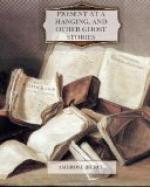John May was acquitted, immediately left the country, and has never been heard of from that day. Shortly afterward his mother and sisters removed to St. Louis. The farm having passed into the possession of a man who owns the land adjoining, and has a dwelling of his own, the May house has ever since been vacant, and has the somber reputation of being haunted.
One day after the May family had left the country, some boys, playing in the woods along May Creek, found concealed under a mass of dead leaves, but partly exposed by the rooting of hogs, a spade, nearly new and bright, except for a spot on one edge, which was rusted and stained with blood. The implement had the initials C. M. cut into the handle.
This discovery renewed, in some degree, the public excitement of a few months before. The earth near the spot where the spade was found was carefully examined, and the result was the finding of the dead body of a man. It had been buried under two or three feet of soil and the spot covered with a layer of dead leaves and twigs. There was but little decomposition, a fact attributed to some preservative property in the mineral-bearing soil.
Above the left eyebrow was a wound—a deep gash from which blood had flowed, covering the whole left side of the face and neck and saturating the light-gray shirt. The skull had been cut through by the blow. The body was that of Charles May.
But what was it that passed through Mr. Odell’s store at Nolan?
“Mysterious disappearances”
THE DIFFICULTY OF CROSSING A FIELD
One morning in July, 1854, a planter named Williamson, living six miles from Selma, Alabama, was sitting with his wife and a child on the veranda of his dwelling. Immediately in front of the house was a lawn, perhaps fifty yards in extent between the house and public road, or, as it was called, the “pike.” Beyond this road lay a close-cropped pasture of some ten acres, level and without a tree, rock, or any natural or artificial object on its surface. At the time there was not even a domestic animal in the field. In another field, beyond the pasture, a dozen slaves were at work under an overseer.
Throwing away the stump of a cigar, the planter rose, saying: “I forgot to tell Andrew about those horses.” Andrew was the overseer.
Williamson strolled leisurely down the gravel walk, plucking a flower as he went, passed across the road and into the pasture, pausing a moment as he closed the gate leading into it, to greet a passing neighbor, Armour Wren, who lived on an adjoining plantation. Mr. Wren was in an open carriage with his son James, a lad of thirteen. When he had driven some two hundred yards from the point of meeting, Mr. Wren said to his son: “I forgot to tell Mr. Williamson about those horses.”




